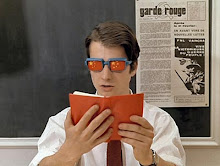I wrote this earlier this year. It needs a lot of work before I'm happy with it, but I couldn't resist the temptation to put it up anyway. Just consider it a rough draft that I think has some good moments.
He just looks like a man standing by a lamppost, but inside he's struggling with the fact that his work leaves him empty, his children are floundering and growing ever more distant, and his wife has grown to hate him. But on this day by the post, all his anguish is directed into the knowledge that the anonymous female cashier in the cafeteria at his work died in her sleep. That woman was essentially the only bright spot at his job; her smile, her dignity, her hands as they did their work, her choice of reading material placed defiantly by the register as if to announce to all comers that she was more than a cashier, more than a drone whose station in life was to handle businessmen's money. They were the kind of books he always wanted to read if he'd ever just slow down and find the time. And now she's gone. So he takes the rest of the day off from work and walks around the city with his thoughts, his memories, his reactions to events, his struggle with the slow build of oppressiveness that life has become for him, and his growing feeling that something has to change. Will it? Ah, ambiguity. Maybe he'll make a cell phone call to his secretary to arrange for flowers for the cashier's funeral. And maybe the story will end with him walking into a used bookstore, some boho side shop that silently screams that it's barely surviving in the current capitalist climate. He'll look around, shelves and stacks of books surrounding him and the splendid aroma of printed matter, age, and neglectful housekeeping mingling together and sending his thoughts racing and rebounding in so many different directions, similar to a pinball rattling around in its machine. He met his wife in a bookstore. The boxes of his daughters books in the basement, boxes that she periodically, with slowly lessening conviction, promises to come home and retrieve. Maybe he'll rent a car, pack them in it, and take them to her. The guy slouching behind the desk, indifferently waiting to possibly maybe take his money reminds him of his son. His son, who wears his emotions on his sleeve, who finds it necessary to argue and shout about injustice at the dinner table, a dinner table where he's been absent for two years. Amazingly, he finds a copy of some book, possibly Camus or Kundera or one of the many magic realists from Latin America, that is the exact same paperback edition, though more tattered from the complex circuitry of previous owners, as the last book he noticed the cashier reading, just the previous week when he bought a bagel with cream cheese that he really didn't want. What he really wanted was to siphon a little energy, some inspiration, some transformative something or other from that red-haired woman in the throes of graceful middle-age on a particularly rotten day at his place of employment. Impulsively, he grabs the book and buys it. $4.50. He pulls out a five. Unlike so many of his colleagues whose actions degrade those who are less fortunate then them, he waits for his change. There is a strangeness to the transaction, the young man confused by the old man, this old man in a suit buying not a Grisham novel for a flight or one of Oprah's picks as a modest gift, but a book that was ripe, that was dripping with the messiness and unresolved constancy of life, a book that draws its inspiration from the reality that life's questions often go unanswered, and that in the struggle and sadness and stressfulness of existence, there is often great beauty. The man waits for his change, silently wishing that this suit of clothes were back in his closet at home, actually preferring to be half naked in the shop instead of in this ensemble of material, clothes that seemed to him to become more suspect every time he sent them to the dry cleaners. And then, quickly, he's out the door, surrounded by street noises, soles of his shoes slapping the sidewalk with just a touch more briskness in his stride than he'd displayed in years. A book in his hand, eyes straight ahead, gazing down the long city street to the vanishing point. Is it overly transcendental of me to say that we are all that man standing by the lamppost? No more than it's overly existential of me to say that this man's struggle isn't over, not by a long shot, not over until he takes his last breath at the end of a life that hopefully can provide him with some sense of closure as the darkness appears and the energy starts to drain from his body. This is life, reality, and what I think is the makings of a good story.
Tuesday, October 28, 2008
Subscribe to:
Post Comments (Atom)

No comments:
Post a Comment